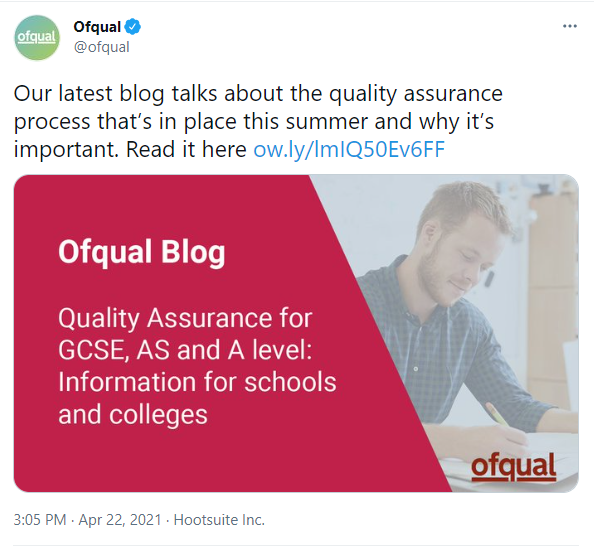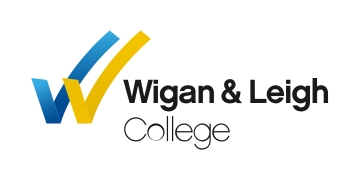On Thursday evening, Ofqual sneaked out a major and fundamental shift in the quality assurance process for this summer’s cancelled exams, almost literally under the cover of darkness.
It came in a friendly, seemingly innocuous blog, rather than in proper revised guidance; it feels like a gut punch to teachers and schools, delivered by an iron fist inside a velvet glove.
We are angry because once again, the centre is saying ‘we do not trust teachers’
We all want consistency and fairness, and we all recognise how difficult that is now. We all know that Ofqual has found itself (or put itself) in an invidious position because there was no meaningful scenario planning back in autumn for a potential cancellation of exams. There was no oven-ready Plan B in January.
We all want a proper QA process that draws on the huge collective expertise across our school system. But what we got yesterday was the equivalent of telling a sixth former to write a 3,000-word essay by tomorrow but that you will not mark it or, indeed, read it.
There is a burning rage across social media, caused, in the short term, by two particular features of the guidance-not-guidance-blog:
Firstly, centres are required to submit their newly developed centre policies to Ofqual, along with a summary. Ofqual does not intend to read the full policy but only the summary.
Because the summary may provoke some questions, every centre will then be required to find time for a phone interview. Here’s an idea…. just read the policy our staff have taken hours to produce.

Secondly, Ofqual has the ability to scrutinise new centres and centres that submit results that may appear anomalous. And they should.
However, all centres will be required to submit a significant sample of evidence at 48 hours’ notice. And yes, you know the punchline already…” subject experts will review the evidence provided by a sample of centres”. Hand in your essays, folks, but I won’t be reading them.
The palpable anger across the system is justified. For the last three years, schools and trusts like mine have worked with urgency to transform teachers’ working lives.
We have done this because it’s the right thing to do, but we have also done it because there is overwhelming evidence that the best way to improve outcomes for young people is to have a good teacher in every single classroom in every single school. No other strategy comes close.
We know that that one of the biggest issues that has driven good teachers from the profession has been the sheer volume of onerous tasks they have been required to do that have no impact on improving outcomes.
Every teacher knows it, every leader knows it, the DfE knows it, and Ofqual really should know it. So why the insistence that school staff undertake hundreds of hours of work that must be submitted but won’t be looked at? This is the dictionary definition of onerous work that has no purpose.
But there is a longer-term cause of the anger too. Ofqual is full of smart people who must have known how this would land. We are angry because once again, the centre is saying “we do not trust teachers”.
We knew it when the Secretary of State said on 13 August 2020, that without an algorithm, some schools “will have literally put every child in as an A* or an A, or B, and that sadly is the truth”.
We knew it last year when we explained to the DfE and Ofqual that comparable outcomes only work when the entire national cohort sits the same exam, but we were ignored. And here we are again.
If there is a real value in us submitting reams of documents so they can sit there unread, then I urge Ofqual to have the professional courtesy to come out and explain it clearly. If they don’t then we will look at the overwhelming weight of evidence of the last 14 months and reach the only conclusion we can reasonable draw – you don’t trust us.








Whilst I agree with the point made in this article that blogs do not and should not be the vehicle for disseminating essential information to schools and colleges in regard to the arrangements for awarding grades this summer, the article contains inaccuracies that only add to the confused state of information being circulated at this time. Schools are not required to submit their QA policies and summaries to Ofqual as stated in the article by Mr Uttley. They are however required to submit such to the awarding bodies. I am in no position to know if this is a misunderstanding on the part of Mr Uttley, or an attempt to score a point. Either way, Schools Week need to urgently clarify that the article is inaccurate and misleading.
An attempt to score a point?! He’s pointed out the onerous, pointless task placed on teachers once again.
The onus should be on the teachers to justify why they should be trusted given their track record.
Last year teachers’ estimates resulted in 38% of students being awarded A and A*s at A level up from 25% a year earlier. An unbelievable level of grade inflation.
And a teacher friend of mine said she would have given all her students a grade higher had she known how little checks were in place on her predictions.
When teachers are allowed to mark their own homework we’ve already seen they can’t be trusted.
Ah, the old ‘teacher friend of mine’ compelling evidence. Whether this individual exists or not one person cannot be used to justify the traducing of an entire profession. Grade inflation is a natural consequence of ever increasing classroom excellence, who would not want that? It’s the examination boards and the DoE who suppress grades to maintain the seeming ‘gold standard’ of top grades with little regard to students’ actual performance. The teachers’ grades however reflected ability and performance, shock horror!
Coming from a school where we are being pushed to give students the papers and model answers. Then teaching to the paper and practicing with the paper. Then giving the same papers to students for a mock that will be used to establish their grade. I completely agree that there should be more scrutiny. However, the guidelines should be clearly and officially stated.